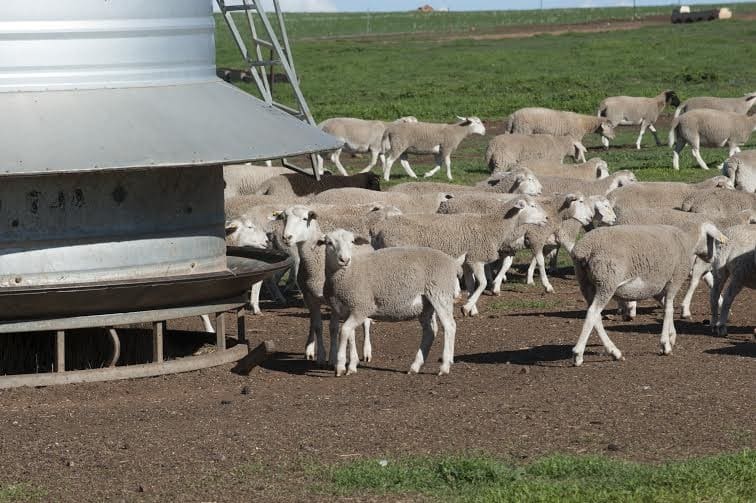
Lambs in feedlots can be prone to Summer pneumonia.
SHEEP producers have been advised to undertake tests for Summer pneumonia in their flocks after research showed a significant incidence among abattoir consignments.
The Joan Lloyd Veterinary Consultancy recently completed 20 abattoir visits since starting a research project in October 2020, inspecting 45,113 sets of ovine lungs and sampling 925.
The consultancy’s latest research update said that in Australia, the combined effect of Mycoplasma ovipneumoniae, Mannheimia haemolytica and Pasteurella multocida is often called Summer pneumonia. To download the research update click here.
All breeds of sheep are susceptible to infection with Mycoplasma ovipneumoniae. Infection persists in a flock in chronic carrier ewes and rams, with infection passing from ewes to lambs soon after birth. Lambs may begin showing signs of infection (wheezing, coughing, difficulty suckling, runny nose) from around 1-2 months of age.
“In our research, approximately 40 percent of abattoir lots have tested positive for Mannheimia haemolytica.
“Lower numbers of abattoir lots (15pc) have tested positive for Pasteurella multocida,” Dr Lloyd said in the report.
“Detection of these two bacteria has been more common during Summer and Autumn.”
Last month, Local Land Service veterinarian Nik Cronin reported that Summer pneumonia was again a significant issue for sheep producers in the region around Forbes in central west New South Wales.
Dr Lloyd said hot dry weather, raised dust, Summer storms, the first shearing and grain feeding can be stressful for lambs, contributing to outbreaks of the disease.
“The hot dry dusty conditions are just as bad for bacterial pneumonia.”
Knowing if Mycoplasma ovipneumoniae is present in a mob of sheep allows appropriate management and treatment strategies to be put in place to control outbreaks of summer pneumonia, she said.
Dr Lloyd told Sheep Central said if producers noticed any coughing in their sheep, difficulty breathing or snotty noses, if unable to get veterinary advice, then they can obtain one of her sheep pneumonia sample collection kits for nasal swabbing and testing. Test results can be available in 24-48 hours.
“Then what is needed is a plan for the property to get on top of the problem.
“That could include a combination of strategic antibiotic treatments as well as testing and culling of chronically infected animals,” she said.
Dr Lloyd said since a Sheep Connect webinar on the issue last year, some producers with affected flocks reported that after testing, strategic antibiotic treatment and culling they had made “quite a bit of headway and really managed to knock the problem on its head.”
“They commented that they had more lambs than ever before and on how well the lambs looked.”
Dr Lloyd said she had no actual data on the impact of Summer pneumonia on reproduction, but she said North American research showed there was an impact on lamb survival, estimating that “in aggregate” Mycoplasma ovipneumoniae’s presence was associated with approximately a 4.3pc reduction in annual lamb production. The research also showed there were carcase impacts in grade and yield.
“The infection goes from the ewe to the lamb and the lambs are infected probably on the day of birth, that’s what the CSIRO found,” Dr Lloyd said.
“What the CSIRO also found was that lambs can suffer a setback when they are around 2-3 weeks of age with a respiratory tract infection is that they have a bit of difficulty breathing and then suckling,” she said.
Dr Lloyd said in the short-term vaccination against Mycoplasma ovipneumoniae probably isn’t an option.
“What’s needed is for people firstly to recognise they have a problem and then there is probably a place for treatment with some animals with antibiotics … and then a program of testing and selective culling.
“I have proposed some further research in that area to try to demonstrate what a control program might look like.”
Dr Lloyd would like to set up a series of farm demonstration sites and discussion groups to talk about the problem.
The abattoir survey of sheep pleurisy/pneumonia pathogens was funded by Animal Health Australia and Meat & Livestock Australia.



Thank you